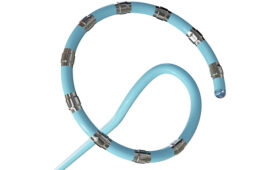 The FDA late last week released draft guidance outlining recommendations for medical devices containing nitinol, an alloy of nickel and titanium, in a push to more fully evaluate materials used in medical devices.
The FDA late last week released draft guidance outlining recommendations for medical devices containing nitinol, an alloy of nickel and titanium, in a push to more fully evaluate materials used in medical devices.
The newly published draft guidance, titled “Technical considerations for non-clinical assessment of medical devices containing nitinol,” includes proposed recommendations on what manufacturers should include in their premarket submission for devices containing the metal.
Included in the guidance are recommended tests to evaluate nitinol devices for susceptibility to corrosion, biocompatibility and performance under certain strains, stresses and temperatures, as well as labeling that includes language about potential allergic reactions and information on how the devices are manufactured and other concerns about material breakdown.
The federal watchdog said it previously issued guidance covering recommendations corrosion and nickel-ion release testing for cardiac devices containing nitinol, but that the guidance was specific to intravascular stents and delivery systems.
As a result, the agency decided to issue a “cross-cutting draft guidance document” to explore broadening those recommendations to all medical devices containing nitinol.
“The materials used in devices are important, both to the function of the device and to the safety of the device because of how the human body may respond to the materials used. That’s why we’ve committed to taking steps to advance the science underlying the effects of specific materials, including nitinol, to inform our evaluation of devices and support the development screening tools to assess potential health risks to individual patients. Nitinol has unique properties that have led to an increase in its use in devices – particularly for orthopedic fracture fixation, cardiovascular stents, guidewires and other devices used in minimally-invasive medical procedures. Devices made with nitinol provide many important benefits to patients, but we need to be able to assess whether, among other things, there are any health risks when the material comes into contact with various parts of the body for extended periods of time. To ensure that the benefits patients receive from these devices outweigh any risks resulting from their use, the FDA needs to receive the right information as part of the premarket review process. To that end, today we are providing manufacturers with a proposal for the types of information they should include in their premarket submission of a device containing nitinol, including testing, labeling, and information on how the device is manufactured and other factors that could affect the breakdown of the material in the body,” FDA CDRH director Dr. Jeff Shuren said in a press release.




